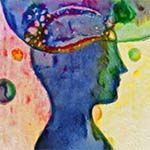Have you ever experienced a tingling sensation after someone whispered into your ear or gently massaged your scalp?
These relaxing tingles are actually referred to as Autonomous Sensory Meridian Response (or ASMR) and are neurological in nature. People describe these brain tingles in various ways – some say they just experienced a brain massage or “braingasm”. ASMR has become so popular that it has yielded AmSMR meditation, an alternative form of meditation that relies on visual and auditory triggers to stimulate a calming state of deep relaxation. You probably experienced some tingling in head during childhood, when other kids played with your hair. Back then, it was hard to put a label on this otherworldly tingling experience.
Different people experience brain tingles from different stimuli. For instance, you could find it pleasurable to listen to someone whispering different sounds into your ear. Another person could experience insane tingles by watching others clicking on plastic or tapping on wood. Although scientists don’t know why exactly our body responds the way it does to some visual and auditory stimuli, more and more individuals are trying our ASMR meditation to restore calm, remain focused in the present and even get some sleep.
Dr. Trungram Gyalwa, a revered researcher and meditation guru, says that meditation helps us to develop natural joys that overcome fear, grief, anger and other negative emotions responsible for our stagnation. Meditation also creates compassion and helps us to gain a deeper, more positive perspective of life. So there’s much more you can gain from ASMR meditation other than the incredible tingling in head – there are feelings of joy, peace, happiness and calm that stem from this practice. But this isn’t to refute the immense sensations we get from these brain tingles. After all, the tingles are a pleasant gift held by our bodies.
How to rekindle your sensitive brain tingles during meditation
Some people fail to experience brain tingles even after trying ASMR meditation for several weeks. There are numerous factors that could reduce your sensitivity to ASMR stimuli, age being the predominant factor. As you grow older, your sensitivity becomes duller. Some people also suffer from misophonia – they hate certain sounds that trigger negative thoughts or emotions. Such people may fail to enjoy ASMR meditation as much, since some particular auditory triggers may remind them of traumatic experiences they suffered in the past.
Here are some other factors that may prevent you from experiencing brain tingles:
- The stereotypical societal mindset that men shouldn’t “feel” as much, since it threatens our masculinity.
- Repressed emotions that we’ve carried from childhood, maybe from terrible experiences or traumas, may prevent you from being open minded to ASMR meditation.
- Watching lots of horror films. That’s right fright-lovers, watching too many horror flicks may install fear in your subconscious and reduce your sensitivity.
- Lacking to travel or read books may leave you closed-minded, preventing you from embracing various ways of thinking. So read a book once in a while or travel to a new place.
- Using prescription medication as opposed to more natural supplements. If you’re fond of taking antidepressants, try switching to an alternative medication since such drugs reduce sensitivity.
- Eating lots of processed meals. If you love eating meat and junk food frequently, consider laying off these meals for a while. They adversely affect your sensitivity.
When the two hemispheres of your brain fail to balance, some cognitive functions may fail to work properly. For instance, using the left side of your brain too much may prevent feelings such as sympathy and sensitivity. However, ASMR meditation can restore balance to your brain and leave you with unbelievable tingling in head. If you desire more help, try Headspace. You’ll benefit from the wide array of meditation resources you’ll get in this app. You can simply download it from the app store and discover the goldmine that lies within.







